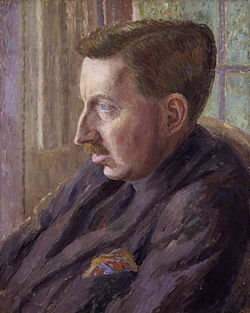E.M. Forster Quote
And the goblins--they had not really been there at all? They were only the phantoms of cowardice and unbelief? One healthy human impulse would dispel them? Men like the Wilcoxes, or ex-President Roosevelt, would say yes. Beethoven knew better. The goblins really had been there. They might return--and they did. It was as if the splendour of life might boil over and waste to steam and froth. In its dissolution one heard the terrible, ominous note, and a goblin, with increased malignity, walked quietly over the universe from end to end. Panic and emptiness! Panic and emptiness! Even the flaming ramparts of the world might fall. Beethoven chose to make all right in the end. He built the ramparts up. He blew with his mouth for the second time, and again the goblins were scattered. He brought back the gusts of splendour, the heroism, the youth, the magnificence of life and of death, and, amid vast roarings of a superhuman joy, he led his Fifth Symphony to its conclusion. But the goblins were there. They could return. He had said so bravely, and that is why one can trust Beethoven when he says other things.
And the goblins--they had not really been there at all? They were only the phantoms of cowardice and unbelief? One healthy human impulse would dispel them? Men like the Wilcoxes, or ex-President Roosevelt, would say yes. Beethoven knew better. The goblins really had been there. They might return--and they did. It was as if the splendour of life might boil over and waste to steam and froth. In its dissolution one heard the terrible, ominous note, and a goblin, with increased malignity, walked quietly over the universe from end to end. Panic and emptiness! Panic and emptiness! Even the flaming ramparts of the world might fall. Beethoven chose to make all right in the end. He built the ramparts up. He blew with his mouth for the second time, and again the goblins were scattered. He brought back the gusts of splendour, the heroism, the youth, the magnificence of life and of death, and, amid vast roarings of a superhuman joy, he led his Fifth Symphony to its conclusion. But the goblins were there. They could return. He had said so bravely, and that is why one can trust Beethoven when he says other things.
Related Quotes
About E.M. Forster
Considered one of the most successful of the Edwardian era English novelists, he was nominated for the Nobel Prize in Literature in 22 separate years. He declined a knighthood in 1949, likely due at least in part to having witnessed the impacts of colonization on India, though he accepted the Order of Merit upon his 90th birthday. Forster was made a Member of the Order of the Companions of Honour in 1953, and in 1961 he was one of the first five authors named as a Companion of Literature by the Royal Society of Literature.
After attending Tonbridge School, Forster studied history and classics at King's College, Cambridge, where he met fellow future writers such as Lytton Strachey and Leonard Woolf. He then travelled throughout Europe before publishing his first novel, Where Angels Fear to Tread, in 1905. The last of his novels to be published, Maurice, is a tale of homosexual love in early 20th-century England. While completed in 1914, the novel was not published until 1971, the year after his death.
Many of his novels were posthumously adapted for cinema, including Merchant Ivory Productions of A Room with a View (1985), Maurice (1987) and Howards End (1992), critically acclaimed period dramas which featured lavish sets and esteemed British actors, including Helena Bonham Carter, Daniel Day-Lewis, Hugh Grant, Anthony Hopkins and Emma Thompson. Director David Lean filmed another well-received adaptation, A Passage to India, in 1984.
